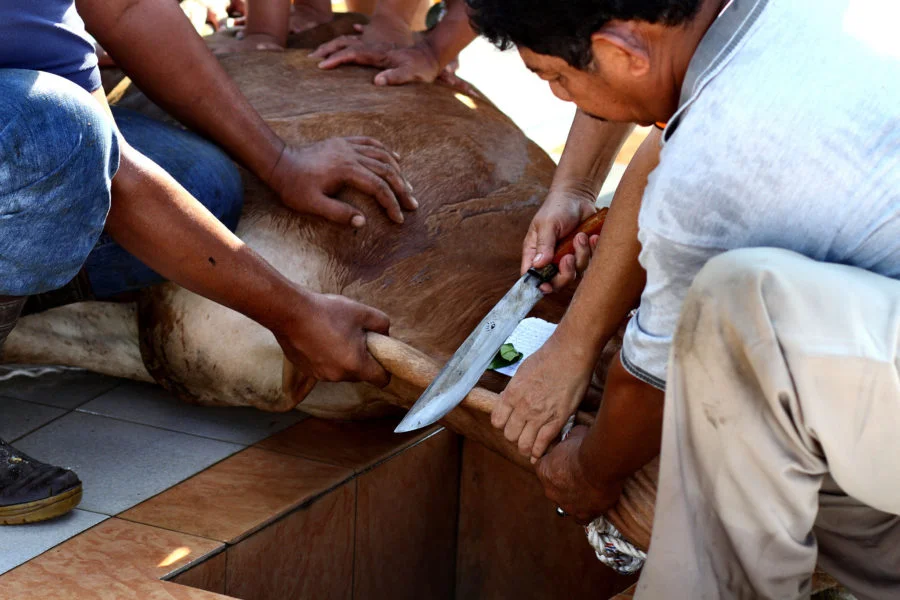Hari Raya Haji, also known as Aidiladha or Eid Al-Adha, is one of the most significant days in the Islamic year! On this date, we commemorate the feeling of togetherness and sacrifice. But that's not all! There are many things about this special date that not many people not many people (even Muslims!) may know about. So sit tight as we answer some of the questions you've probably always wondered about Hari Raya Haji!
1. Didn't you just celebrate Hari Raya?
Indeed, we did. However, each celebration holds distinct significance. Hari Raya Puasa, also known as Eid al-Fitr, commemorates the conclusion of the fasting month of Ramadan. On the other hand, Hari Raya Haji signifies the culmination of the peak of Hajj, the sacred pilgrimage to the holy city of Mecca. It is obligatory for every physically and financially capable Muslim to perform Hajj at least once in their lifetime.

Credit: menj on Flickr
In the Islamic calendar, there is a specific month, Zulhijjah, during which Muslims have the opportunity to undertake the Hajj pilgrimage. However, due to the time constraint and the limited capacity in Mecca, not all individuals who are physically and financially able can perform Hajj every year. In fact, the waitlist for Hajj can extend for several years or even decades!
2. What Hari Raya Haji greeting should I use when wishing my Muslim friends?
If you're planning to wish your Muslim friends this Hari Raya Haji, there are a few ways to do so!
- Selamat Hari Raya Haji
- Selamat Hari Raya AidilAdha
- Eid Mubarak
- Eid al-Adha Mubarak
- Happy Eid al-Adha
3. So what's the difference between Hari Raya Haji and Hari Raya Puasa?
Hari Raya Haji is also known as the "Feast of the Sacrifice", and the highlight of Hari Raya Haji is not to go house-visiting but to honour the willingness of Prophet Ibrahim to sacrifice his son as an act of obedience to God. While Ibrahim was prepared to perform this heartbreaking act as an act of faith and obedience to God, his son was not actually sacrificed! Just when the Prophet was about to carry out the command, God intervened and replaced his son with a sheep. So now, we sacrifice (Qurban) a sheep during Hari Raya Haji to recognise this sacrifice and to show our own devotion to God. ☺️

The ritual is significant as it reminds us of the meaning of sacrifice. Each of us is probably going through our own personal sacrifices and at times, giving up seems easier. But if we stand firm in our belief in God - just like how Prophet Ibrahim did - we will definitely be given the strength to pull through our challenges
4. But why are the animals tortured?

Credit: Mohd Fazlin Mohd Effendy Ooi on Flickr
Regrettably, there have been conflicting reports regarding the execution of the ritual. However, we can assure you that the animals are certainly not subjected to torture. On the contrary, their well-being and comfort are prioritized throughout the entire process. Islam's method of slaughter guarantees a swift and compassionate death for the animals, ensuring their welfare is maintained.
One of the conditions of animal slaughter in Islam is that a sharp knife must be used and the two jugular veins (windpipe and food-tract) must be cut, not beheaded. As this leads to a sudden loss of blood from the brain, the animal's body will shut down almost immediately - ensuring a fast and almost painless death. During the ritual, some countries like Singapore take it a step further as all 'slaughtermen' have to be trained. MUIS (the Islamic body in Singapore) also conducts pre-inspections of participating premises and on-site inspection during the ritual.
5. The sheep is so big, how do you finish all the meat?
Actually, that's not the case! As we mentioned earlier, Hari Raya Haji revolves around the concept of sacrifice, and this principle extends to the distribution of meat as well. While we may have purchased the sheep for the ritual, we are not the sole beneficiaries of the meat. In fact, it is highly encouraged for Muslims to donate a significant portion of the meat to those in need.
6. Do you give green packets or Eid presents on Hari Raya Haji?
While it is not customary, you have the option to give green packets if you choose to do so! Surprisingly, the practice of giving green packets is not a mandatory aspect of Islam. It is merely a tradition. Moreover, if you decide to give, it is important to give according to your own means and affordability. In Islam, sincerity forms the foundation of our beliefs, and we believe that pure and sincere intentions are crucial in all our actions. Therefore, there is no need to adhere to a predefined 'standard' rate for green packets.
If you're a non-Muslim who's been invited to a Muslim friend's house for a Hari Raya get-together and you're unsure about whether to give out green packets to their children, don't be afraid to ask your friend about it! There you go! We hope we've clarified some of your questions about Hari Raya Haji. But don't stop here! Share this article with your friends so they too would know what this special date is all about!


